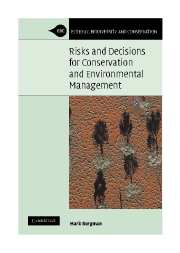Book contents
- Frontmatter
- Contents
- Preface
- Acknowledgments
- 1 Values, history and perception
- 2 Kinds of uncertainty
- 3 Conventions and the risk management cycle
- 4 Experts, stakeholders and elicitation
- 5 Conceptual models and hazard assessment
- 6 Risk ranking
- 7 Ecotoxicology
- 8 Logic trees and decisions
- 9 Interval arithmetic
- 10 Monte Carlo
- 11 Inference, decisions, monitoring and updating
- 12 Decisions and risk management
- Glossary
- References
- Index
2 - Kinds of uncertainty
Published online by Cambridge University Press: 03 December 2009
- Frontmatter
- Contents
- Preface
- Acknowledgments
- 1 Values, history and perception
- 2 Kinds of uncertainty
- 3 Conventions and the risk management cycle
- 4 Experts, stakeholders and elicitation
- 5 Conceptual models and hazard assessment
- 6 Risk ranking
- 7 Ecotoxicology
- 8 Logic trees and decisions
- 9 Interval arithmetic
- 10 Monte Carlo
- 11 Inference, decisions, monitoring and updating
- 12 Decisions and risk management
- Glossary
- References
- Index
Summary
Uncertainty pervades the natural environment and obscures our view of it. To organize ideas about uncertainty, this book uses a taxonomy of uncertainty created by Regan et al. (2002a). At the highest level, it distinguishes between epistemic and linguistic uncertainty.
Epistemic uncertainty exists because of the limitations of measurement devices, insufficient data, extrapolations and interpolations, and variability over time or space. There is a fact, but we don't know it exactly. This is the domain of ordinary statistics and conventional scientific training.
Linguistic uncertainty, on the other hand, arises because natural language, including our scientific vocabulary, often is underspecific, ambiguous, vague, context dependent, or indeterminate. It is distinguished from epistemic uncertainty because it results from people using words differently or inexactly.
This chapter introduces the concepts of epistemic and linguistic uncertainty. It defines several subtypes within each broad category. It provides some examples of each and outlines the methods that may be best suited to treating them.
Epistemic uncertainty
Epistemic uncertainty reflects incomplete knowledge. It has several main types: measurement error, systematic error, natural variation, model uncertainty and subjective judgement. Each arises in different ways. A variety of well-known statistical methods are available to treat them (e.g. Sokal and Rohlf 1995).
Variability and incertitude
The terms ‘variability’ and ‘incertitude’ make a simple taxonomy of epistemic uncertainty worth describing because of its utility. Variability is naturally occurring, unpredictable change, differences in parameters attributable to ‘true’ heterogeneity or diversity in a population.
- Type
- Chapter
- Information
- Publisher: Cambridge University PressPrint publication year: 2005
- 1
- Cited by



